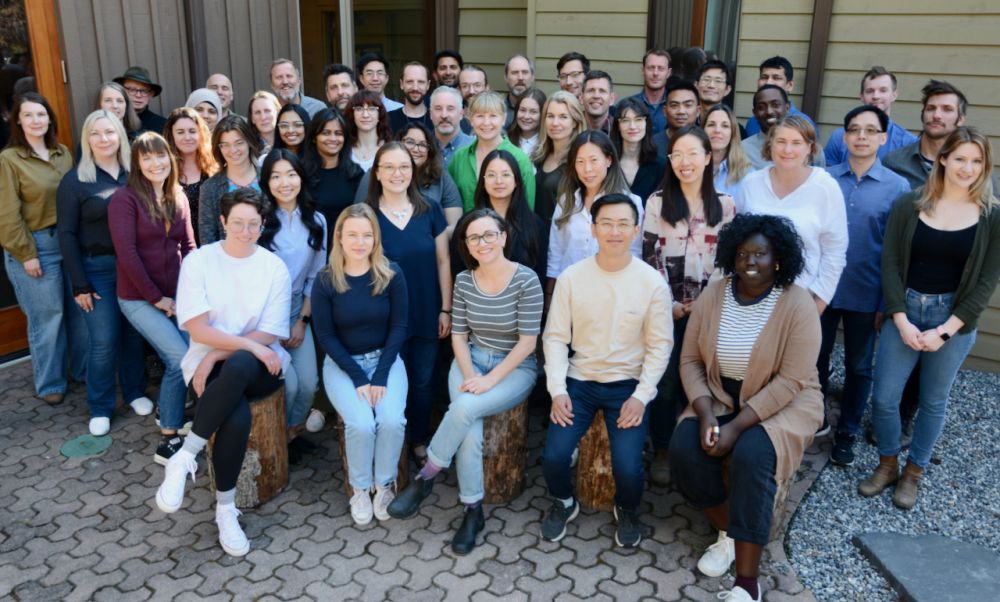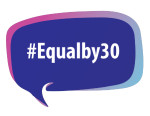
Our commitments to reconciliation, equity, diversity, inclusion and intersectionality
 Equal pay, equal leadership and equal opportunities
Equal pay, equal leadership and equal opportunities
The Pembina Institute is pleased to be a signatory of Natural Resources Canada’s Equal by 30 campaign, a public commitment to work towards equal pay, equal leadership and equal opportunities for women in the clean energy sector by 2030.
"The Pembina Institute works to advocate for policies that support women and gender-diverse individuals in energy-related workplaces. This work is additionally reflected in our internal recruitment and retention processes. We strive to model policies that include better access to training and education opportunities for women; flexible and safe workplaces; supports for intersectional and gender-diverse leadership; and access to more detailed data that can be used transparently to track progress."
- Kendall Anderson, Director, Equitable Transition Program
Our preliminary commitments
- We will work to prevent discrimination in recruitment practices by taking non-traditional career trajectories and non-standard work experience into account in recruitment decisions. We will ensure a balance of gender representation on every hiring committee.
- We will aim for equal representation of women* at all levels of the Pembina Institute and report on these results annually.
- We will aim for equal representation of women as board members at the Pembina Institute and report on these results annually.
- We will recognize non-binary gender identification and support use of inclusive pronouns.
- We will conduct an annual gender-based analysis of pay at the Pembina Institute including breakdowns of pay levels for all staff, director-level positions and other positions, and report on these results annually.
- We will assess and ensure our policies support flexible work hours, telecommuting, working part-time, and parental leave.
- We will continue to learn about gender equity and Equal by 30 principles, including to facilitate the exchange of best practices and knowledge-sharing where possible among our peers, clients and supporters.
*This includes all people who identify as women.
How we’re doing
We have established an internal working group with a representative from senior leadership and diverse gender representation. Our organization has 55 staff and 11 board members.
Results (as of May 2023)
- 64% of our board members are women
- 59% of our staff are women
- 50% of our director-level positions are held by women
- For non-director level positions at Pembina, salaries for women are 9% higher than salaries for men.
- For director-level positions, salaries for women are 5% lower than salaries for men
- For all staff, salaries for women are 3% lower than for salaries for men
For an organization like the Pembina Institute with a small staff, some deviations are expected due to wide variety of other factors that inform salaries (e.g. education, work experience, level of responsibility and different job descriptions).
These commitments are only a starting point for the organization. Moving forward, we will work to identify additional opportunities to ensure that Pembina Institute is an example for the transition to a clean economy is equitable and inclusive.
REDII for change
The Pembina Institute is committed to reconciliation, equity, diversity, intersectionality, and inclusion (REDII) in the workplace.
When we think about Canada’s clean energy transition, we need to make sure that the transformation happens in a way that is not only innovative and capable of meeting society’s need for energy, but also considers equity. The need for greater diversity and inclusion is emerging as a critical component in any strategy for resilience in a world that continues to be subject to new global shocks and disruptions.
People of all sexes, gender identities, sexual orientations, races, ethnicities, ages, and abilities have a stake in the transition to a new energy economy. The Pembina Institute seeks not only to make the world better, but better for everyone.
“The Pembina Institute is beginning a journey of meaningful work with Indigenous Peoples. This is rooted in fostering the right-relationships and taking steps to educate ourselves as an organization. We acknowledge that to do so, we must recognize our organization’s role in both the ongoing impacts of colonization and the processes of Reconciliation. We are developing a Reconciliation Action Plan to prioritize our next steps."
- Chris Severson-Baker, Executive Director